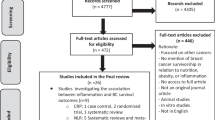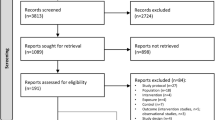Abstract
Purpose
Adipokines and inflammatory factors can affect breast cancer (BC) prognosis and recurrence among breast cancer survivors (BCSs). This study was to evaluate the effects of synbiotic supplementation along with a low-calorie diet on some recurrence-related factors such as adiponectin, tumor necrosis factor-alpha (TNF-α), and high-sensitivity C-reactive protein (hs-CRP) among obese and overweight BCSs.
Methods
We performed a randomized, triple-blind, placebo-controlled clinical trial among 76 overweight or obese postmenopausal women with a history of hormone-receptor-positive BC. Participants were randomly divided into 2 groups to intake either 109 CFU/day synbiotic supplement or placebo (n = 38 each group) for 8 weeks. All participants were given a low-calorie diet program. The primary outcome was serum concentration of adiponectin which was measured at baseline and after 8 weeks.
Results
Compared with the placebo, synbiotic intake significantly increased adiponectin (+ 13.58 (10.08, 18.17) vs. − 0.42 (− 2.90, 1.98) μg/ml; P < 0.001). In addition, synbiotic supplementation resulted in significant reduction in TNF-α levels (− 17.09 (− 32.05, − 13.60) vs. 0.20 (− 3.97, 2.00) ng/L; P < 0.001) and hs-CRP levels (− 1.14 (− 1.90, − 0.88 vs. − 0.06 (− 0.38, 0.15) mg/L; P < 0.001) compared with the placebo.
Conclusions
In conclusion, 8-week synbiotic consumption by overweight and obese postmenopausal BCSs had beneficial effects on adiponectin, TNF-α, and hs-CRP.
Trial registration
IRCT, IRCT20091114002709N49. Registered 18 May 2018, http://www.irct.ir: IRCT20091114002709N49

Similar content being viewed by others
Data availability
The datasets used and/or analyzed during the current study are available from the corresponding author on reasonable request.
References
Society AC (2018) American Cancer Society Facts & Figures 2019
Mayne ST, Playdon MC, Rock CL (2016) Diet, nutrition, and cancer: past, present and future. Nat Rev Clin Oncol 13(8):504–515
Miyoshi Y, Funahashi T, Kihara S, Taguchi T, Tamaki Y, Matsuzawa Y, Noguchi S (2003) Association of serum adiponectin levels with breast cancer risk. Clin Cancer Res 9(15):5699–5704
Oh SW, Park C-Y, Lee ES, Yoon YS, Lee ES, Park SS, Kim Y, Sung NJ, Yun YH, Lee KS (2011) Adipokines, insulin resistance, metabolic syndrome, and breast cancer recurrence: a cohort study. Breast Cancer Res 13(2):R34
Cai X, Cao C, Li J, Chen F, Zhang S, Liu B, Zhang W, Zhang X, Ye L (2017) Inflammatory factor TNF-α promotes the growth of breast cancer via the positive feedback loop of TNFR1/NF-κB (and/or p38)/p-STAT3/HBXIP/TNFR1. Oncotarget 8(35):58338–58352
Ji H, Cao R, Yang Y, Zhang Y, Iwamoto H, Lim S, Nakamura M, Andersson P, Wang J, Sun Y (2014) TNFR1 mediates TNF-α-induced tumour lymphangiogenesis and metastasis by modulating VEGF-C-VEGFR3 signalling. Nat Commun 5(1):1–17
Heikkilä K, Ebrahim S, Lawlor DA (2007) A systematic review of the association between circulating concentrations of C reactive protein and cancer. J Epidemiol Community Health 61(9):824–833
Lee S, Choe J-W, Kim H-K, Sung J (2011) High-sensitivity C-reactive protein and cancer. J Epidemiol:1102220216-1102220216
Nagpal R, Kumar A, Kumar M, Behare PV, Jain S, Yadav H (2012) Probiotics, their health benefits and applications for developing healthier foods: a review. FEMS Microbiol Lett 334(1):1–15
Schrezenmeir J, de Vrese M (2001) Probiotics, prebiotics, and synbiotics—approaching a definition. Am J Clin Nutr 73(2):361s–364s
Gibson GR, Hutkins R, Sanders ME, Prescott SL, Reimer RA, Salminen SJ, Scott K, Stanton C, Swanson KS, Cani PD (2017) Expert consensus document: The International Scientific Association for Probiotics and Prebiotics (ISAPP) consensus statement on the definition and scope of prebiotics. Nat Rev Gastroenterol Hepatol 14(8):491–502
Gareau MG, Sherman PM, Walker WA (2010) Probiotics and the gut microbiota in intestinal health and disease. Nat Rev Gastroenterol Hepatol 7(9):503–514
Behrouz V, Jazayeri S, Aryaeian N, Zahedi MJ, Hosseini F (2017) Effects of probiotic and prebiotic supplementation on leptin, adiponectin, and glycemic parameters in non-alcoholic fatty liver disease: a randomized clinical trial. Middle East J Dig Dis 9(3):150–157
Scott KP, Gratz SW, Sheridan PO, Flint HJ, Duncan SH (2013) The influence of diet on the gut microbiota. Pharmacol Res 69(1):52–60
Ma LX, Bulsara MK, Tan SY, Vardy J (2016) Body weight management in overweight and obese breast cancer survivors. The Cochrane Library
Craig CL, Marshall AL, Sjorstrom M, Bauman AE, Booth ML, Ainsworth BE, Pratt M, Ekelund U, Yngve A, Sallis JF (2003) International physical activity questionnaire: 12-country reliability and validity. Med Sci Sports Exerc 35(8):1381–1395
Duggan C, Irwin ML, Xiao L, Henderson KD, Smith AW, Baumgartner RN, Baumgartner KB, Bernstein L, Ballard-Barbash R, McTiernan A (2011) Associations of insulin resistance and adiponectin with mortality in women with breast cancer. J Clin Oncol 29(1):32–39
Le TKC, Hosaka T, Nguyen TT, Kassu A, Dang TO, Tran HB, Pham TP, Tran QB, Le THH, Da Pham X (2015) Bifidobacterium species lower serum glucose, increase expressions of insulin signaling proteins, and improve adipokine profile in diabetic mice. Biomed Res 36(1):63–70
Kim S-W, Park K-Y, Kim B, Kim E, Hyun C-K (2013) Lactobacillus rhamnosus GG improves insulin sensitivity and reduces adiposity in high-fat diet-fed mice through enhancement of adiponectin production. Biochem Biophys Res Commun 431(2):258–263
Feizollahzadeh S, Ghiasvand R, Rezaei A, Khanahmad H, Hariri M (2017) Effect of probiotic soy milk on serum levels of adiponectin, inflammatory mediators, lipid profile, and fasting blood glucose among patients with type ii diabetes mellitus. Probiot Antimicrob Proteins 9(1):41–47
Rouhani MH, Hadi A, Ghaedi E, Salehi M, Mahdavi A, Mohammadi H (2019) Do probiotics, prebiotics and synbiotics affect adiponectin and leptin in adults? A systematic review and meta-analysis of clinical trials. Clin Nutr 38(5):2031–2037
Dieudonne M-N, Bussiere M, Dos Santos E, Leneveu M-C, Giudicelli Y, Pecquery R (2006) Adiponectin mediates antiproliferative and apoptotic responses in human MCF7 breast cancer cells. Biochem Biophys Res Commun 345(1):271–279
Kang JH, Lee YY, Yu BY, Yang B-S, Cho K-H, Yoon DK, Roh YK (2005) Adiponectin induces growth arrest and apoptosis of MDA-MB-231 breast cancer cell. Arch Pharm Res 28(11):1263–1269
Barb D, Pazaitou-Panayiotou K, Mantzoros CS (2006) Adiponectin: a link between obesity and cancer. Expert Opin Investig Drugs 15(8):917–931
Cruceriu D, Baldasici O, Balacescu O, Berindan-Neagoe I (2020) The dual role of tumor necrosis factor-alpha (TNF-alpha) in breast cancer: molecular insights and therapeutic approaches. Cell Oncol (Dordr) 43(1):1–18. https://doi.org/10.1007/s13402-019-00489-1
Guo L, Liu S, Zhang S, Chen Q, Zhang M, Quan P, Lu J, Sun X (2015) C-reactive protein and risk of breast cancer: a systematic review and meta-analysis. Sci Rep 5(1):1–8
Tabrizi R, Ostadmohammadi V, Lankarani KB, Akbari M, Akbari H, Vakili S, Shokrpour M, Kolahdooz F, Rouhi V, Asemi Z (2019) The effects of probiotic and synbiotic supplementation on inflammatory markers among patients with diabetes: a systematic review and meta-analysis of randomized controlled trials. Eur J Pharmacol 852:254–264
Eslamparast T, Poustchi H, Zamani F, Sharafkhah M, Malekzadeh R, Hekmatdoost A (2014) Synbiotic supplementation in nonalcoholic fatty liver disease: a randomized, double-blind, placebo-controlled pilot study. Am J Clin Nutr 99(3):535–542
Loman BR, Hernández-Saavedra D, An R, Rector RS (2018) Prebiotic and probiotic treatment of nonalcoholic fatty liver disease: a systematic review and meta-analysis. Nutr Rev 76(11):822–839
Shi H, Kokoeva MV, Inouye K, Tzameli I, Yin H, Flier JS (2006) TLR4 links innate immunity and fatty acid–induced insulin resistance. J Clin Invest 116(11):3015–3025
Shi X-Z, Lindholm PF, Sarna SK (2003) NF-κB activation by oxidative stress and inflammation suppresses contractility in colonic circular smooth muscle cells. Gastroenterology 124(5):1369–1380
Lee J-H, Lee B, Lee H-S, Bae E-A, Lee H, Ahn Y-T, Lim K-S, Huh C-S, Kim D-H (2009) Lactobacillus suntoryeus inhibits pro-inflammatory cytokine expression and TLR-4-linked NF-κB activation in experimental colitis. Int J Color Dis 24(2):231–237
Anderson A, McNaught C, Jain P, MacFie J (2004) Randomised clinical trial of synbiotic therapy in elective surgical patients. Gut 53(2):241–245
Asemi Z, Zare Z, Shakeri H, S-s S, Esmaillzadeh A (2013) Effect of multispecies probiotic supplements on metabolic profiles, hs-CRP, and oxidative stress in patients with type 2 diabetes. Ann Nutr Metab 63(1-2):1–9
Hatakka K, Martio J, Korpela M, Herranen M, Poussa T, Laasanen T, Saxelin M, Vapaatalo H, Moilanen E, Korpela R (2003) Effects of probiotic therapy on the activity and activation of mild rheumatoid arthritis–a pilot study. Scand J Rheumatol 32(4):211–215
Zhang J, Du P, Chen D, Cui L, Ying C (2010) Effect of viable Bifidobacterium supplement on the immune status and inflammatory response in patients undergoing resection for colorectal cancer. Zhonghua Wei Chang Wai Ke Za Zhi 13(1):40–43
Sadrzadeh-Yeganeh H, Elmadfa I, Djazayery A, Jalali M, Heshmat R, Chamary M (2010) The effects of probiotic and conventional yoghurt on lipid profile in women. Br J Nutr 103(12):1778–1783
Hegazy SK, El-Bedewy MM (2010) Effect of probiotics on pro-inflammatory cytokines and NF-κB activation in ulcerative colitis. World J Gastroenterol: WJG 16(33):4145–4151
Acknowledgments
We would like to gratefully thank the participants for their support in the study. We are also thankful for Zist Takhmir Company. We thank Nilou laboratory for the biochemical analysis of this project.
Funding
This study was supported by Iran University of Medical Sciences (IUMS), Tehran, Iran. No: IR.IUMS.REC1397.32557.
Author information
Authors and Affiliations
Contributions
Farzad Shidfar, Mahsa Raji Lahiji, Mitra Zarrati, and Safa Najafi contributed in the conception, data collection, and manuscript drafting. Bahare Yazdani, Elhameh Cheshmazar, Elham Razmpoosh, and Leila Janani were involved in laboratory testing and analysis, statistical analysis, and manuscript writing. All authors read and approved the final manuscript.
Corresponding author
Ethics declarations
Conflict of interest
The authors declare that they have no conflict of interest.
Ethics approval
All procedures performed in this study were in accordance with the ethical standards of the Iranian clinical trial (http://www.irct.ir: IRCT20091114002709N49) and with the 1964 Helsinki Declaration and Good Clinical Practice guidelines. The study was approved by The Iran University of Medical Science Ethical Committee (IR.IUMS.REC1397.32557).
Consent to participate
Informed consent was obtained from all individual participants included in the study.
Consent for publication
Additional informed consent was obtained from all individual participants for whom identifying information is included in this article.
Additional information
Publisher’s note
Springer Nature remains neutral with regard to jurisdictional claims in published maps and institutional affiliations.
Rights and permissions
About this article
Cite this article
Raji Lahiji, M., Zarrati, M., Najafi, S. et al. Effects of synbiotic supplementation on serum adiponectin and inflammation status of overweight and obese breast cancer survivors: a randomized, triple-blind, placebo-controlled trial. Support Care Cancer 29, 4147–4157 (2021). https://doi.org/10.1007/s00520-020-05926-8
Received:
Accepted:
Published:
Issue Date:
DOI: https://doi.org/10.1007/s00520-020-05926-8




